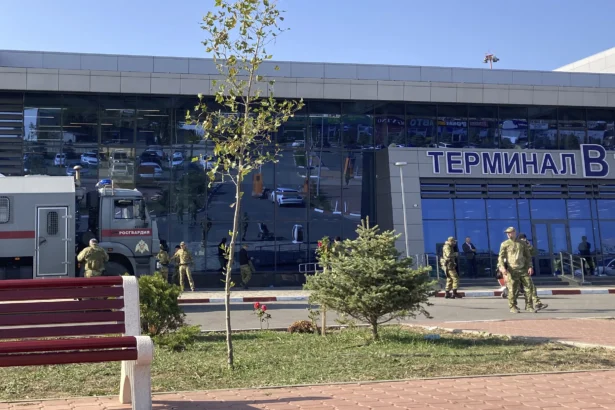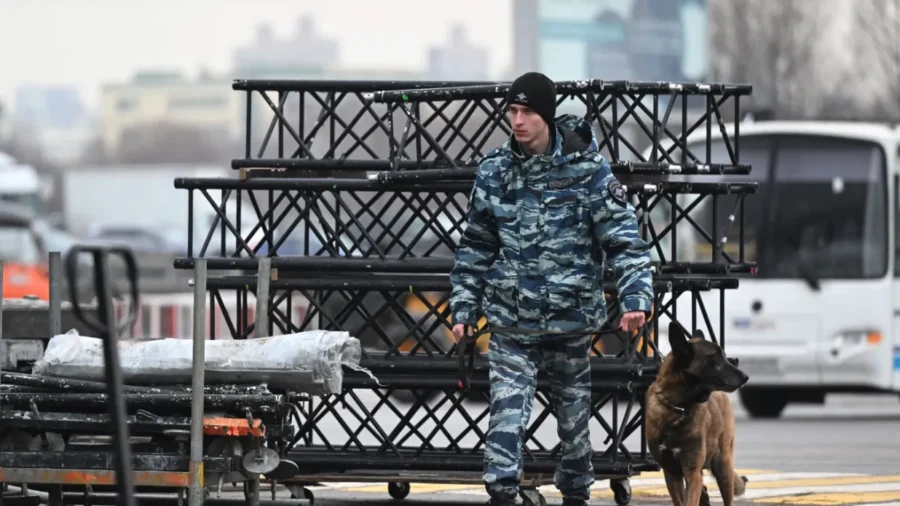Three terrorist suspects have been detained in what Moscow is calling a “counter-terrorism operation” carried out in Russia’s southern Dagestan region.
“This morning, security apparatuses detained three individuals in [the cities of] Makhachkala and Kaspiysk who had been planning terrorist offenses,” Russia’s National Antiterrorism Committee said in a March 31 statement.
The suspects were found in possession of automatic weapons, ammunition, and explosive devices, according to the statement.
The Epoch Times could not independently verify the report, which comes in the wake of a March 22 shooting attack in Moscow that killed scores of Russian civilians.
The majority-Muslim Republic of Dagestan is located in the Caucasus region, between the Black and Caspian seas, and shares borders with Georgia and Azerbaijan.
Makhachkala is Dagestan’s regional capital. Kaspiysk is a coastal city that sits roughly 12 miles southeast of Makhachkala.
Russia has remained on high alert since the attack in Moscow, where gunmen killed more than 140 concertgoers—and left scores more injured—at a popular entertainment venue.
It was the deadliest terrorist attack inside Russian territory in two decades.
Nine suspects, including several Tajik nationals, have since been detained in connection with the incident and remain under interrogation.
Russian officials have strongly implied that Kyiv, in coordination with its Western allies, was involved in planning the deadly attack.
Russian President Vladimir Putin has vowed to “find and punish all those involved in this atrocity.”
In televised remarks, Mr. Putin alleged—without providing evidence—that the perpetrators had tried to flee to Ukraine after carrying out the attack.
On March 29, a Russian investigative committee repeated the claims.
“After committing the crime, the terrorists … drove towards the Ukrainian border as instructed by their handler,” the committee said in a statement.
It also claimed to have evidence, which it has yet to present, that the perpetrators had received payments—in both cash and cryptocurrency—from Ukraine.
Kyiv, for its part, rejects Russian claims that it played any role in the incident.
“They [the Russians] are burning our cities, and then they try to blame Ukraine [for the Moscow attack],” Ukrainian President Volodymyr Zelenskyy said in a social-media post.
Meanwhile, both the United States and France have claimed to have “intelligence” implicating the “Islamic State” (ISIS) terrorist group in the attack.
Following the incident, ISIS did indeed claim responsibility, releasing video footage that purportedly shows the attack in progress.
Moscow, however, remains skeptical regarding the notorious group’s alleged involvement.
Earlier this week, a Russian Foreign Ministry spokeswoman said it was “hard to believe” that ISIS could carry out such a sophisticated operation.
She went on to accuse Washington of trying to whitewash Kyiv’s involvement—and its own—by “resorting to the ISIS bogeyman.”
When asked about the Russian claims, a U.S. State Department spokesperson told The Epoch Times: “ISIS bears sole responsibility for this attack.”

Ambiguous Links
On March 30, Russia’s Federal Security Service (FSB) launched a wide-ranging “counter-terrorism operation” in Dagestan after receiving information on the whereabouts of “armed persons involved in terrorist activities.”
Within the scope of the operation, the FSB raided “several apartments” in residential areas of Makhachkala and Kaspiysk, Russia’s TASS state news agency reported.
Yusup Umavov, Makhachkala’s Moscow-appointed mayor, later declared that the operation had ended in both cities at noon (local time) on March 31.
Russian officials later announced the arrest of three suspects but refrained from saying whether the arrests had been made in connection with the Moscow attack.
For almost a decade until 2017, Russia fought a bloody insurgency by armed Islamist groups in Dagestan and the nearby regions of Chechnya and Ingushetia.
Last October, Dagestan made international headlines when local residents stormed the Makhachkala airport to protest the arrival of a flight from Israel.
Angered by Israel’s ongoing military offensive in the Gaza Strip, pro-Palestinian protesters stormed the airport, where many clashed with police.
At least 20 people were injured in the melee, including police officers, while scores were arrested by the local authorities.
At the time, a White House spokesperson condemned the incident as an example of surging “anti-Semitism.”
Israeli Prime Minister Benjamin Netanyahu, for his part, called on Moscow to “act resolutely … against wild incitement directed against Jews and Israelis.”
Some Russian officials, however, have sought to blame the airport incident on “provocations and online incitement” by malicious foreign actors.
“Western attempts to destabilize the situation in the North Caucasus continue,” Nikolay Patrushev, the head of Russia’s Security Council, said earlier this month.
“Last October’s events in Dagestan were a vivid example of this,” he told TASS on March 7.
Mr. Patrushev also noted the recent “elimination” by Russian security forces of several alleged ISIS members in Ingushetia.
On March 3, Russian security forces killed six alleged group members in an operation carried out in the Ingush town of Karabulak, according to local officials.
Reuters contributed to this report.
From The Epoch Times


